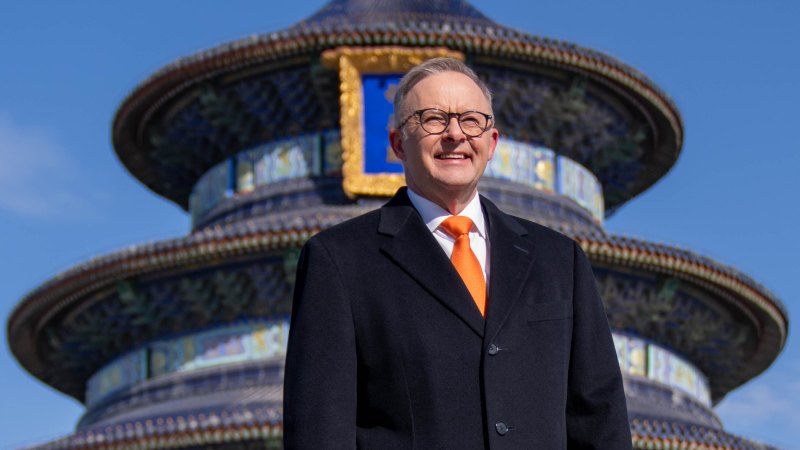Save articles for later
Add articles to your saved list and come back to them any time.
Prime Minister Anthony Albanese is assuring voters he can deliver stronger economic growth from crucial talks in China to mend ties with Australia’s biggest trading partner, saying he has formed a “positive and respectful” relationship with Chinese President Xi Jinping.
Albanese warned of “strategic competition” from the rise of China but emphasised the gains for Australia in the economic relationship, a key agenda in his talks with the country’s top three leaders this week.
Prime Minister Anthony Albanese visited the Temple of Heaven in Beijing, touring the temple grounds with the Chinese ambassador to Australia, Xiao Qian.
“I’m convinced that we’re building a relationship that’s constructive – one where we’re able to talk with each other directly,” he said of his dealings with Xi.
Albanese is the first Australian prime minister to meet Xi in the Chinese capital since 2016 and has arrived two weeks after a visit to the United States, where President Joe Biden said “trust but verify” should be the approach to dealing with China.
Asked whether he trusted Xi, the prime minister indicated the Chinese president had been a man of his word in their dealings to date.
“We have different political systems, but the engagement that I’ve had with China, with President Xi, have been positive. They have been constructive,” he said.
“He has never said anything to me that has not been done, and that’s a positive way that you have to start off dealing with people.
“But we recognise as well that we come with different political systems, very different values arising from that, and different histories. But we deal with each other at face value.”
In a key message to voters about the importance of his visit, Albanese pointed to the Australian exporters at a Shanghai trade fair this week to emphasise the economic gains from his visit.
“I was with 250 Australian businesses. That’s about Australian jobs, that has an impact on our economy, that has an impact on inflation. It has an impact,” he said.
“We’re a trading nation. This is very much in Australia’s national interest for us to be engaged, just as it was in Australia’s national interest for me to be engaged in the United States.”
The prime minister retraced the steps of his Labor predecessor Gough Whitlam on Monday morning, visiting the Temple of Heaven in Beijing as the former Labor leader did in 1973 and emphasising the historic return of an Australian leader to the Chinese capital.
Flanked by Foreign Minister Penny Wong, the prime minister toured the temple grounds with the Chinese ambassador to Australia, Xiao Qian.
Speaking to reporters after the temple visit, Albanese restated his government’s support for the AUKUS alliance on nuclear-powered submarines with the US and the United Kingdom despite fierce objections from China.
“We’re committed to AUKUS and we’re busy implementing it,” he said.
“And that’s what I mean by dealing with people honestly, upfront. We’ve been upfront about our engagement.
“We think that AUKUS is in Australia’s national interest. We also think that AUKUS is a vehicle to promote security, peace and stability in the region.”
Asked about China’s stated goal of reunification with Taiwan despite the island state’s objections, Albanese said the government supported the status quo.
Wong said the visit fulfilled an election commitment.
“Before the election, we said to the Australian people we would work to stabilise the relationship with China without compromising our sovereign interest and that’s what we’ve done. We look forward to continuing to engage on many issues including the continued movement of trade impediments and many other aspects.
“I will be having the opportunity to be with the prime minister but also to meet with the Foreign Minister [Wang Yi] and look forward to meeting him and talk about how we can navigate this relationship wisely. The history of [former] prime minister Whitlam being here, reminds us that whoever is in these jobs, it is incumbent upon us to seek to navigate the relationship wisely. That’s what we are here to do.”
Vivian Zhao, who represents Australian whisky, apples and water exporters in China, said the last three years had been tough on businesses.
“It was a bit desperate,” she said. “Now we can see so many Australian brands coming back.”
Zhao said the perception of Australia had shifted on Chinese social media sites, which are moderated by the government, after years of campaigns against Australian products.
“It is much, much better,” she said. “I can see on WeChat, now there are lots of positive comments.”
Cut through the noise of federal politics with news, views and expert analysis from Jacqueline Maley. Subscribers can sign up to our weekly Inside Politics newsletter here.
Most Viewed in Politics
From our partners
Source: Read Full Article


